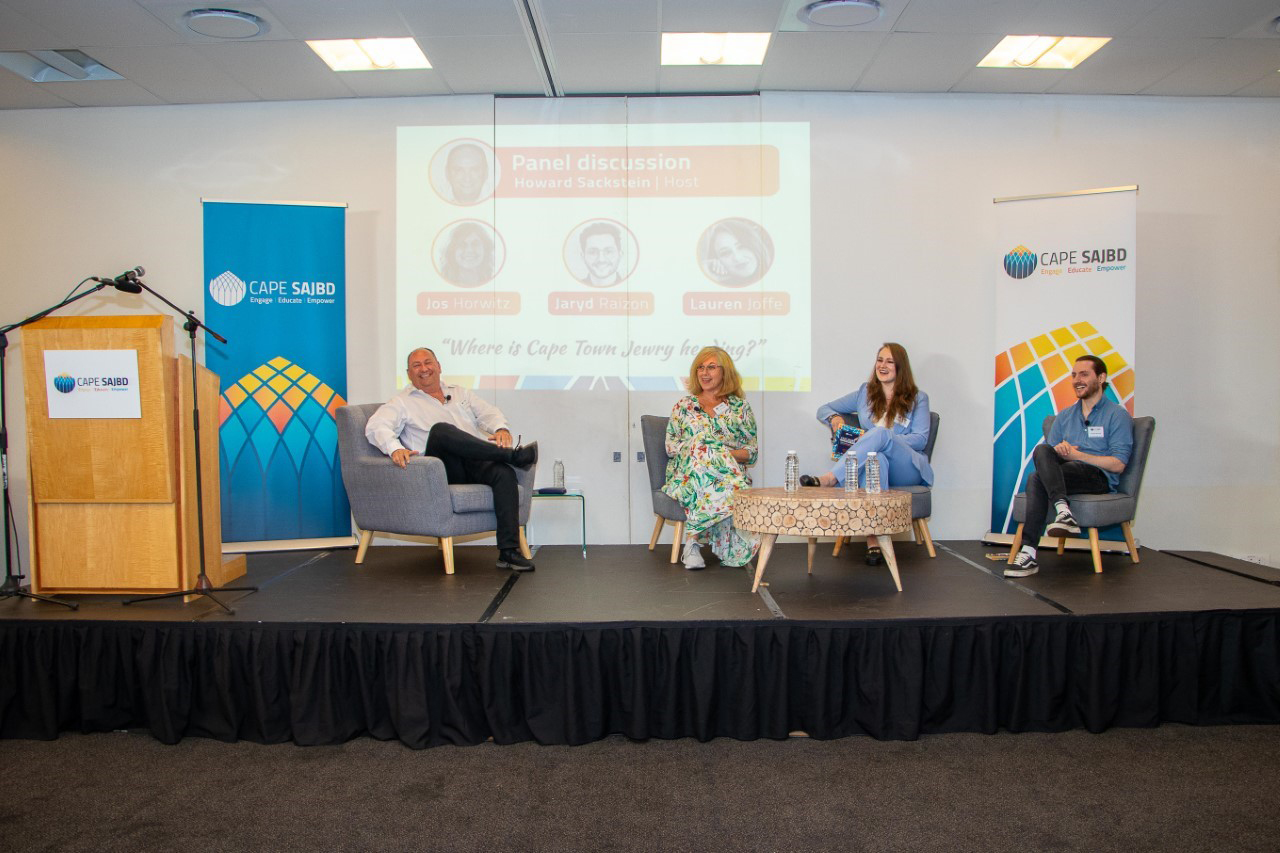click to dowload our latest edition
CLICK HERE TO SUBSCRIBE TO OUR NEWSLETTER


Published
2 years agoon
The future of Cape Town Jewry “continues to look remarkable”, Howard Sackstein said following a panel discussion on the issue at the Cape South African Jewish Board of Deputies (SAJBD) 2021 Conference on 31 October.
Sackstein, the non-executive chairperson of the SA Jewish Report, moderated the panel with Jos Horwitz, the head of early child development at United Herzlia Schools; Jaryd Raizon, the Africa director of the Knowledge Trust; and Lauren Joffe, the director behind Simcha and Derech Eretz on SABC 2.
The Cape SAJBD chose a kaleidoscope to represent the conference, reflecting the different colours, shapes, sizes, and facets of the Jewish community. The idea is that when all these elements merge, they form a harmonious and beautiful pattern.
“That’s why we’ve taken a small sample of intergenerational people in our panel today, each bringing a unique richness of experience, skills, talents, and choices, all of whom have contributed to South African society as well as our Jewish communal life,” said Cape SAJBD Deputy Chairperson Adrienne Jacobson.
United Herzlia Schools was frequently mentioned during the discussion because these Cape Town-based school have continued to upgrade and restructure their education for years, said Horwitz.
“Our students are no longer experiencing rote teaching and sitting in lessons or doing tests just to make sure they getting A’s,” said Horwitz. “It’s about working on projects, collaborating, team teaching, and learning how to make your own learning. In fact, we’ve just done a beautiful little thing. We asked the students, ‘What do you want to learn next week?’ They said, ‘Soccer’, So, we got into soccer.”
Horwitz said the Cape Town Jewish community should change the way it gives to charity. “Giving everything that we have in excess, or that we don’t want anymore, bringing tzedakah [charity] every Friday and raising money are the wrong ways to go about it. As young people, we need to collaborate more. When Herzlia invites a school to come and share resources, it should be about what can we share together.”
Although Herzlia has provided “an absolutely brilliant education” for her sons, Horwitz admitted that its students are limited to interacting with Jewish middle-class or upper-class friends. “As parents, you have to think how you can help them to engage in the greater community.”
Raizon said that though the Jewish community did do a lot of good, “the reality is that everyone in the country needs to do more to give to those who previously haven’t had opportunities. The unemployment rate in the Jewish community is very low. It’s 2%.”
Joffe agreed, saying, “We’re very fortunate that the majority of the Jewish community is middle to upper class. There’s a huge gap.”
That gap could be narrowed through partnership between schools, and not just for a sports day once a year. “I understand the Israel-Palestine issue, but if there’s a Muslim high school down the road, why can’t a Jewish school partner with it?”
She recalled how she learnt about the Quran at school to accommodate a Muslim student, by, for example, comparing the two religions during class.
Sackstein believes we can learn from the Muslim community. “When one thinks of the Muslim community, one organisation that comes to the mind is Gift of the Givers,” he said. “Now, there are probably 500 equivalent Jewish organisations from Afrika Tikkun to the Union of Jewish Women, but our community doesn’t have a common brand.”
As a trustee of Afrika Tikkun, Sackstein said he never heard anyone referring to this organisation as “a Jewish organisation”. For this reason, he said the Jewish community should be “branding the efforts that we do under one central brand, so people understand the contribution of our community to the broader society”.
“One thing that should be done differently in the schools, which can speak to the greater brand, is focused work on understanding the greater context in which we live,” Raizon said.
He believes the Mensch Network, an organisation of social entrepreneurs, does “incredible work” to bring together entrepreneurs, innovators, and individuals in the Jewish community who want to do impactful work in the greater community.
Sackstein spoke about his favourite Jewish community in the world, in Panama. It consists, he said, of 11 000 people all living in one single area of the country’s capital city.
“Almost 90% are shomré Shabbat, and many keep kosher at home because the community has decided on certain norms of what it means to be a community,” he said.
Sackstein said that we can learn a lesson from the pandemic, which is that technology means people no longer need to be in the same place.
“I attend shul services all over the world while sitting in Johannesburg,” he said. “I watch rabbis speaking to me from the United Kingdom or America, and I’m participating in world Jewish events. We’ve separated location and community.
“What we should be doing is saying we’ve got an unbelievably thriving community with 12 000 people. Yet, we’ll have a thriving community with 1 000 and 8 000 because technology has allowed us to extract the culture, the affiliation, and the commitment out of our community.
“We need to reimagine what community looks like in the new era. You’re in a privileged position here in Cape Town. You have things like water and electricity, which we sometimes don’t have in Joburg. More importantly, you have a commitment to the future of the city and South Africa. That’s so admirable.”
